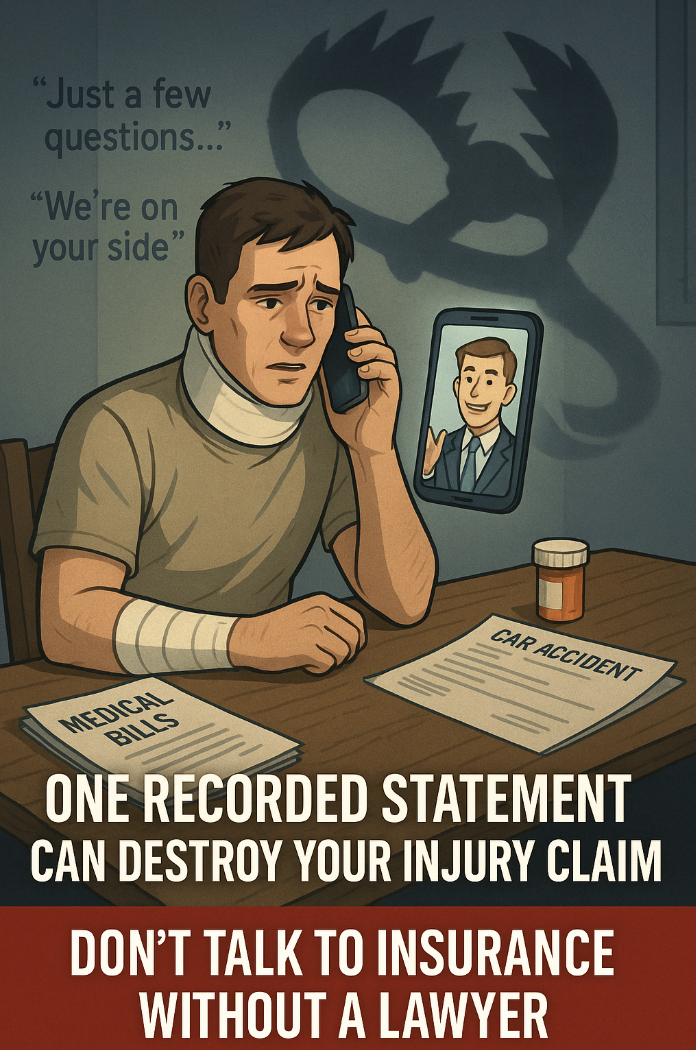If you have been involved in a car crash injury in Indiana, chances are you will get a call from an insurance adjuster asking for a recorded statement. It might seem routine. It might even seem helpful. But here is the reality: one recorded statement can derail your entire claim.
The truth is, saying the wrong thing — even by accident — can cost you thousands of dollars or even your right to recover compensation. This blog explains why recorded statements are dangerous, how insurance companies use them, and why you should speak with an Indiana car crash attorney before saying anything.
What Is a Recorded Statement and Why Is It a Risk?
A recorded statement is a formal interview where an insurance adjuster asks you questions about the crash, your injuries, and the events surrounding it. Your responses are recorded and will be used throughout the claim process.
The catch is this: insurance adjusters are trained to use your own words against you. Their job is to limit what the insurance company pays. Even the most well-meaning comments can be twisted to reduce or deny your claim. You may think you are helping your case by cooperating, but in reality, you may be handing them reasons to avoid paying you fairly.
How One Simple Answer Can Hurt Your Car Crash Injury Case
Let’s say you are asked how you are feeling, and you answer that you are doing a little better. That sounds harmless, but the insurance company might use that to argue your injuries are not serious. If you later require physical therapy, imaging, or surgery, they may claim you are exaggerating or being dishonest.
If the adjuster asks whether you could have done anything to avoid the crash and you respond with “maybe,” they can say you accepted partial fault. Under Indiana’s modified comparative fault system, even small admissions can result in significant reductions in compensation or even block your recovery altogether.
This is why the insurance company wants a recorded statement. It is not to help you. It is to help themselves.

The Friendly Adjuster Is Not Your Friend
Many adjusters sound kind and helpful. They might say the other driver already admitted fault. They might promise that a recorded statement is just a formality. Some may even claim they are looking out for your best interest.
The truth is different. Insurance companies evaluate adjusters based on how little they pay out. The less you receive, the better the adjuster looks to their supervisor. Even if they sound like they are on your side, remember they are working for the insurance company. You need someone working for you.
Are You Legally Required to Give a Recorded Statement?
Here is the good news. In Indiana, you do not have to give a recorded statement to the insurance company representing the at-fault driver. There is no law that requires this. You can say no.
The only time you are required to provide a statement is if your own insurance company requests it. This is common in cases involving underinsured or uninsured motorist coverage. If you refuse, your own coverage could be jeopardized.
However, be cautious when the at-fault party and you share the same insurance company. In those situations, always begin by asking:
Are you representing me in this claim?
Are you also handling the claim for the other driver?
These questions are essential to avoid conflicts of interest.
When You Should Never Give a Recorded Statement
There are times when it is especially dangerous to give a recorded statement.
If you have serious injuries such as broken bones, surgery, or long-term medical care, you should not speak to insurance without legal help. These are high-value cases, and the insurance company will do everything it can to reduce its exposure.
If the accident was complicated or involved multiple vehicles, it is very likely that responsibility will be contested. Insurance companies love to shift blame to avoid paying. A recorded statement can give them exactly what they need to do that.
If you feel rushed or pressured to give a statement, take a step back. If they are pushing for speed, there is a reason. They are trying to get your version of events before you have all the information.
Situations Where a Statement Might Be Acceptable
There are limited situations where giving a recorded statement may be okay.
Your own insurance company may require one. In that case, be sure they are acting in your interest, not on behalf of the other driver.
If your issue is limited to vehicle damage and not injuries, you can usually discuss property damage with the insurance company. Just be clear that you are only discussing the condition and value of your car. Do not discuss how the crash happened or your physical injuries.
In very small injury cases where you have no legal representation and the case does not justify hiring an attorney, you may need to give a statement to resolve the claim. Even then, be very careful.
How to Handle a Recorded Statement If You Must Give One
If you are required or decide to give a recorded statement, keep the following in mind:
Speak clearly and keep your answers short.
Do not speculate or guess. If you are unsure, say you do not know.
Answer only what is asked. Do not offer extra information.
Avoid statements that are overly broad or dramatic.
Write down what you say or consider recording your side for consistency later.
Ask in advance what topics will be covered so you can prepare your thoughts.
The goal is to provide honest answers without opening the door to unnecessary risk.
Why Hiring an Indiana Car Crash Attorney Changes Everything
Handling a car crash injury claim is overwhelming. You may be dealing with pain, medical appointments, lost income, and pressure from the insurance company. Trying to do all of this alone puts you at a disadvantage.
A trusted Indiana car crash attorney knows how to push back against insurance tactics. They can take over communication, help preserve your rights, and make sure your statement—or your silence—does not get used against you.
Working with an attorney levels the playing field and gives you the chance to focus on what matters most: your recovery.
Make the Right Call
If you have been hurt in a car crash and are being asked to give a recorded statement, take a breath. You do not have to handle this alone. Talk to someone who understands how these claims work and can help protect your future.
Call the Marc Lopez Law Firm at 463-288-6270 and let us turn your frustration into compensation.



